Brazil–Italy relations
Brazil–Italy relations refers to the diplomatic relations between Brazil and Italy. Both nations enjoy friendly relations, the importance of which centres on the history of Italian migration to Brazil. Approximately 31 million Brazilians claimed to have Italian ancestry (approximately 15% of the population) making it the largest number of people with full or partial Italian ancestry outside Italy, with the Brazilian city of São Paulo being the most populous city with Italian ancestry in the world.[1] Both nations are mutual members of the G20 major economies, United Nations and the World Trade Organization.
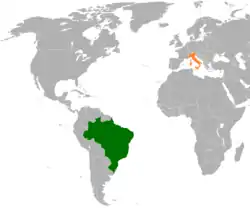 | |
Brazil |
Italy |
|---|---|
History
In September 1822, Brazil declared its independence from Portugal. In 1826, the Duchy of Parma recognized the independence of Brazil and in 1827, and ambassador from the Kingdom of the Two Sicilies arrived to Brazil.[2] In 1836, future Italian unifier Giuseppe Garibaldi went into exile in Brazil and assisted in the separatist movement for the Brazilian State of Rio Grande do Sul.[3] In 1861, Brazilian Emperor Pedro II recognized the Kingdom of Italy under King Victor Emmanuel II.[4] In November 1861, Italy opened a diplomatic mission in Rio de Janeiro.[2] In October 1871, Emperor Pedro II traveled to Italy as part of his European tour.[5]
Italian migration to Brazil began in 1875 when Brazil began to promote migration to the country in order to increase its population and therefore created 'colonies' mostly in rural areas for Italians and other Europeans to migrate to.[6] Between 1880 and 1920, more than one million Italians immigrated to Brazil.[6] In 1924, Italian Prince of Piedmont (future King Umberto II) visited the city of Salvador, Bahia as Rio de Janeiro (the Brazilian capital at the time) was considered unsafe for the Prince and São Paulo was temporary taken over by rebels.[7] The Prince's main visit to Brazil (and other South American nations) was part of a political plan of fascism to link the Italian people living outside Italy with their mother country.[7]
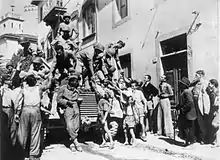
During World War I, Brazil declared war on the Central Powers after the sinking and capturing of several Brazilian merchant ships and was the only Latin American nation to actively be involved in the war by sending eight war ships to Europe and 100 paramedics to France.[8] At the end of the war, both Brazil and Italy partook in the Treaty of Versailles.
At the start of World War II in September 1939; Brazil remained neutral, however, German submarines (U-Boats) sank six Brazilian ships in the Atlantic and Brazil declared war on Germany and Italy on 22 August 1942.[9] During the war, Brazil sent an Expeditionary Force consisting of 23,000 soldiers which partook in the Italian Campaign.[10] The Brazilian forces mainly fought within Tuscany and Emilia-Romagna regions. In 1944, Brazil restored full diplomatic relations with Italy.[4]
Since the end of the world wars, both Brazil and Italy have strengthen their relations by agreeing to several bilateral accords such as an Agreement on Migration (1977);[11] Agreement to avoid Double Taxation (1979);[12] Extradition Treaty (1989);[13] Treaty on Legal Cooperation in Criminal Matters (1993);[14] Agreement on Scientific and Technological Cooperation (1997), among others.[4] Both nations are active players in international organizations and leaders of both nations have paid official visits to each other nations, respectively, on numerous occasions.
High-level visits
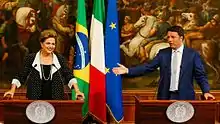
High-level visits from Brazil to Italy[4]
- President Fernando Collor de Mello (1990)
- President Fernando Henrique Cardoso (1997)
- President Luiz Inácio Lula da Silva (2005, 2009)
- President Dilma Rousseff (2013, 2015)
High-level visits from Italy to Brazil[4][15][16][17]
- President Giuseppe Saragat (1965)
- President Oscar Luigi Scalfaro (1995)
- President Carlo Azeglio Ciampi (2000)
- Prime Minister Romano Prodi (2007, 2009)
- Prime Minister Silvio Berlusconi (2010)
- Prime Minister Matteo Renzi (2016)
Trade
In 2015, total trade between Brazil and Italy totaled US$7.4 billion.[4] Italy is one of Brazil's top ten biggest trading partners globally. In 2013, Italian investments in Brazil totaled US$17.9 billion.[4] Italian car makers such as Ferrari, Fiat and Lamborghini have a presence in Brazil, as well as Italian fashion and food products. Brazilian companies such as Embraer and agricultural companies operate in Italy. In 2000, member nations of Mercosur (which includes Brazil) and the European Union (which includes Italy) began negotiations on a free trade agreement.[18]
Transportation
There are direct flights between Brazil and Italy with the following airlines: Alitalia and LATAM Brasil .
Resident diplomatic missions
- Brazil has an embassy in Rome[19] and a consulate-general in Milan.[20]
- Italy has an embassy in Brasília,[21] consulates-general in Curitiba,[22] Porto Alegre,[23] Rio de Janeiro,[24] São Paulo,[25] and consulates in Belo Horizonte[26] and in Recife.[27]
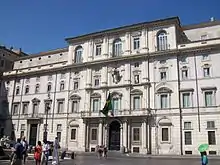 Embassy of Brazil in Rome
Embassy of Brazil in Rome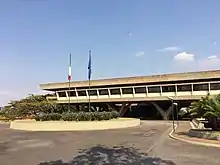 Embassy of Italy in Brasília
Embassy of Italy in Brasília Consulate-General of Italy in Porto Alegre
Consulate-General of Italy in Porto Alegre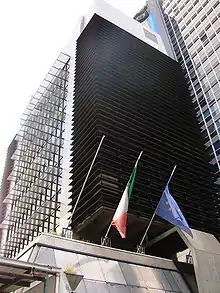 Consulate-General of Italy in São Paulo
Consulate-General of Italy in São Paulo
See also
References
- Encontro analisa imigração italiana em MG (in Portuguese)
- Brasil - Itália (in Portuguese)
- Giuseppe Garibaldi: Exile in South America
- "Brazilian Ministry of Foreign Affairs: Italy". Archived from the original on 2019-01-07. Retrieved 2017-01-15.
- Dom Pedro the Magnanimous, Second Emperor of Brazil (pg. 159-161)
- The Italian Culture in Sao Paulo
- Umberto II, re d'Italia (King of Italy)
- Brazil in the First World War
- A History of Brazil
- Brazil in World War Two - The Campaign in Italy
- "Agreement between Brazil and Italy on Migration (in Portuguese)" (PDF). Archived from the original (PDF) on 2013-06-20. Retrieved 2017-01-15.
- Brazil and Italy sign and Agreement on avoiding Double Taxation (in Portuguese)
- "Extradition Treaty between Brazil and Italy (in Portuguese)". Archived from the original on 2017-01-18. Retrieved 2017-01-15.
- Tratado sobre Cooperação Judiciária em Matéria Penal (in Portuguese)
- President Oscar Luigi Scalfaro visits Brazil (in Portuguese)
- Silvio Berlusconi in Brazil (in Portuguese)
- Matteo Renzi se diz emocionado em visitar Salvador (in Portuguese)
- European Commission: Mercosur
- Embassy of Brazil in Rome
- Consulate-General of Brazil in Milan
- Embassy of Italy in Brasilia
- Consulate-General of Italy in Curitiba
- Consulate-General of Italy in Porto Alegre
- Consulate-General of Italy in Rio de Janeiro
- Consulate-General of Italy in São Paulo
- Consulate of Italy in Belo Horizonte
- Consulate of Italy in Recife
